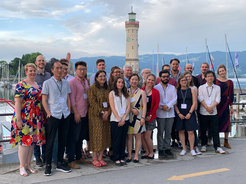Meeting point Lindau
After two years of online only encounters, the Lindau Nobel Laureate Meeting 2022 took place onsite again
This year, the Lindau Nobel Laureate Meeting took place as in-person event again after a two-year, pandemic-enforced hiatus with only online activities. The small town on Lake Constance has been the venue for the annual meeting of top scientists since 1951. For a whole week, there are lectures, discussions and social events where young scientists can talk to the science. Five Nobel Prize Laureates from the Max Planck Society participated in the event, as well as 22 young researchers from Max Planck Institutes who successfully passed a rigorous multi-stage application and selection process. This year's meeting was dedicated to the subject of chemistry.

Max Planck Nobel Laureates included Benjamin List from the Max Planck Institute für Kohlenforschung, who received the Nobel Prize last year for his discovery of asymmetric organocatalysis, as well as Stefan Hell, Hartmut Michl, Erwin Neher, and Robert Huber. PhD candidate Clara Nussbaumer had the opportunity to meet Hell for an exclusive lunch. The atmospheric chemist has been a doctoral student at the Max Planck Institute for Chemistry since 2020. "The lunch was much longer than originally planned," she reports. Stefan Hell took the time to answer many questions, also pointing out the dangers in the science system: in his own career he had the experience that others tried to claim his ideas as their own.
Clara also talked to other Nobel Laureates. Her conclusion: "All Nobel Prize winners have incredibly exciting stories to tell. Most are individualists who, despite often strong opposition and many rejections throughout their careers, believed in their ideas and kept going. I find that very encouraging, because in our daily lives we tend to follow the mainstream." She just has one regret: "It's a real shame that I didn't get to talk to Paul Crutzen more often. When I started at the Institute and spotted his name on the office door, it was a really special feeling." Crutzen, who died in 2021, received the Nobel Prize in 1995 for explaining the causes of the hole in the ozone layer.
Isabel Harriehausen from the MPI for Dynamics of Complex Technical Systems in Magdeburg sees herself as a chemical engineer and was therefore hesitant at first to apply to a conference primarily addressed to chemists. For her, the focus is not only on scientific achievement but also on the social role of the Nobel Prize Laureates. "The conference has bolstered my belief that science communication is more important than ever. This is why I would like to contribute to making scientific content more understandable and accessible to the public and improving the image of scientists in our society. Academic research is very important and relevant for sustainable and long-term progress of a society. At the same time, social progress also takes place in industry. Unlike most of the participants at this conference, I have chosen a future in industry and look forward to learning about new aspects and perspectives there."
The share of female young researchers who took part in Lindau this is year is 45 percent. This year, the jury also included two emeriti from the Max Planck Society, Wolfgang Lubitz and Stefan Kaufmann, who are greatly committed to supporting young researchers. To ensure fair decisions, they also take the non-scientific criteria into account. "For example, it is important to know that applicants from Israel are older on average because they have to serve a longer period of military service there," says Lubitz.
The Nobel Laureate Meeting was established after World War II to promote international scientific exchange. The focus alternates between chemistry, physics, and medicine. In August, the Nobel Laureates in economics will meet in Lindau.
SK
